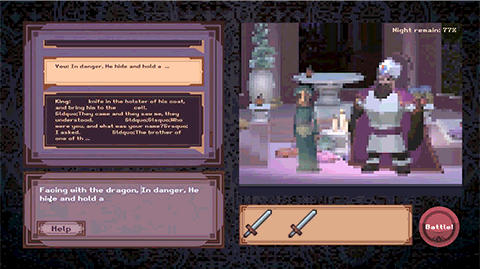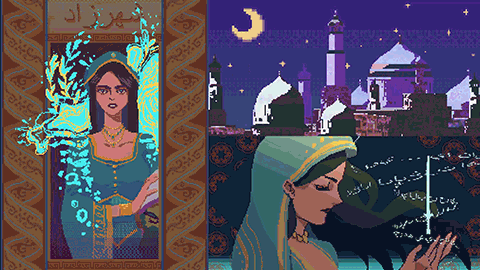1001 Nights
Game
The game is a rebellious version of the Arabian folklore collection, Arabian Nights, enabled by machine learning. In this collaborative hallucination, a player can write stories with the AI,
Play it online: https://sunyuqian1997.itch.io/once-thousand-and-one-night
In the game, a player will act as the girl Scheherazade. Each night, the player has to tell tales to the Sasanian King to postpone the execution, and the king will continue the story in turns. Scheherazade has a special ability to turn words into reality: When the king’s continuation contains words like “sword”, “knife” or “shield”, those object will materialize and drop on player's hand. This allows the character to fight the king. If the player defeats him, Scheherazade will free herself and the other characters from execution.
Play it online: https://sunyuqian1997.itch.io/once-thousand-and-one-night
In the game, a player will act as the girl Scheherazade. Each night, the player has to tell tales to the Sasanian King to postpone the execution, and the king will continue the story in turns. Scheherazade has a special ability to turn words into reality: When the king’s continuation contains words like “sword”, “knife” or “shield”, those object will materialize and drop on player's hand. This allows the character to fight the king. If the player defeats him, Scheherazade will free herself and the other characters from execution.


If videogames are the hallucination created by the computer, then machine learning with creativity can keep it growing according to the player's intuition. The base of the game, Arabian Nights, is a classic example of a framed story and embedded narrative: the character narrates a set of tales, and tales contain other tales. Based on the folklore, with the text-generation algorithm, this game allows players to affect the direction of the story by telling stories itself through natural language. With the help of machine learning, I aim to create the embodiment of the transcending language inside the game, present a procedural rhetorical experience that makes metaphor and language invade into reality, just like Wittgenstein’s statement: The limits of my language mean the limits of my world(Wittgenstein 2001).

The game includes two parts: storytelling and battle. In the first part , the player needs to keep telling stories to lead the King with AI behind to produce story continuation that includes the important items for battle. The King's AI model is trained on fanfictions through a modified transformer model(ColorfulClouds/Dreamily-Beta-1 2021), so it's familiar with common tropes in various adventure stories. For instance, if the player writes a paragraph about a knight meet a demon on the road, then the king might say "The knight slashed his blade", then the player could materialize the word "blade" and put it into the inventory.


After getting weapons, the player can enter the turn-based battle part to fight with the king. Under the structured digital environment, the game not only produces entertaining experience, but also provides a creative writing collaboration with AI , and the result of writing will change the environment itself.
The game is an example of AI as Ia breaks out of a closed environment. In the traditional game, the narrative is closed, and all the endings and narratives are scripted. In this game, the king, as an individual, is always providing the player with new scenarios, and the content is translated into entities that in turn influence the narrative. Although the actual outcome of the game can be one of two things: defeat the king or be killed, no player will take the same path or make up the same story. This can be understood as an example of the materialization of virtual information.
Conference & Exhibitions
Publication
Y. Sun, X. Ni, H. Feng, R. LC., Lee, C. H. Lee and A. Asadipour, “Bringing Stories to Life in 1001 Nights: A Co-creative Text Adventure Game Using a Story Generation Model”, International Conference on Interactive Digital Storytelling (ICIDS 2022)
Longlisted on 2022 Lumen Prize.
Exhibited at 2021 Asia Digital Art Exhibition, New York Lattitude Gallery, Shanghai Aiiiii Art center, 2021 Chengdu Biennale, etc.
Poster presented at ISEA 2022.
Demo presented 2022 Foundation of Digital Games.